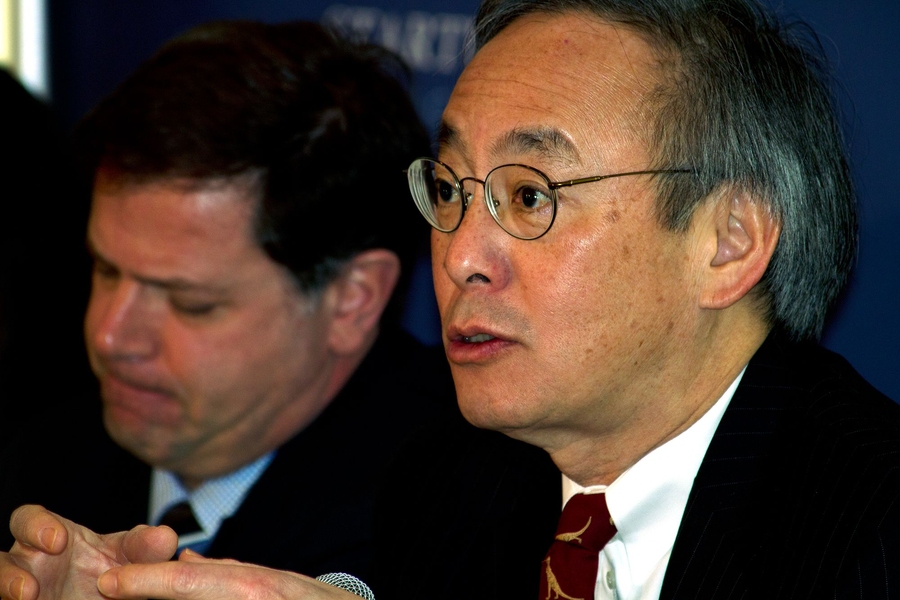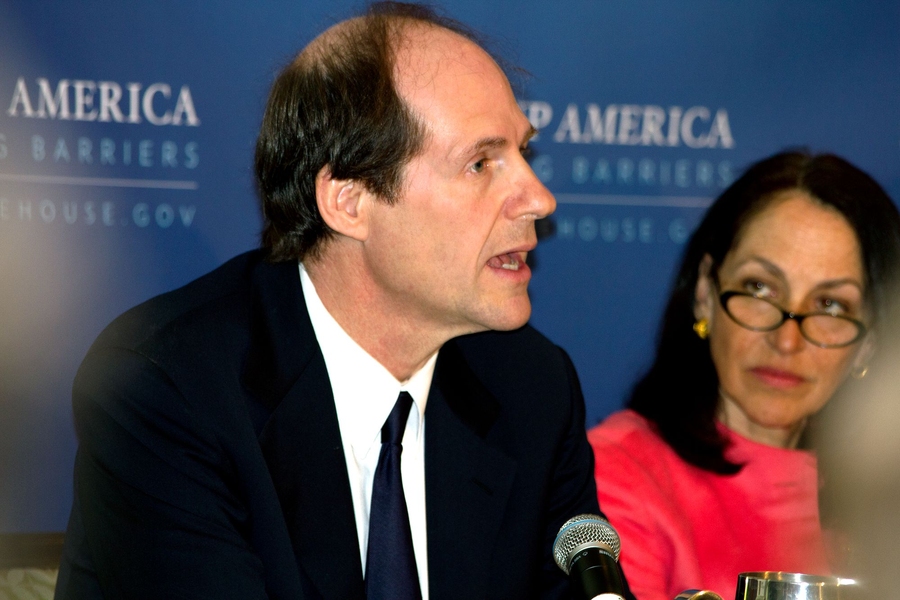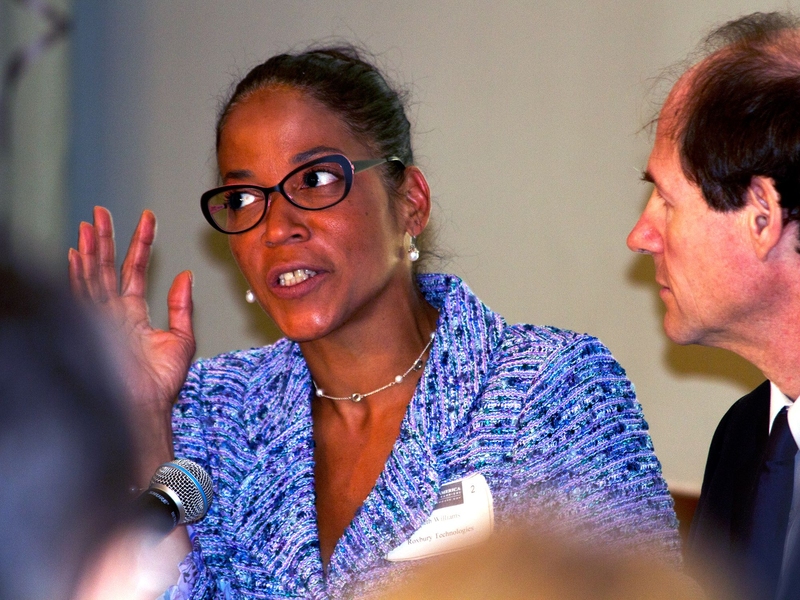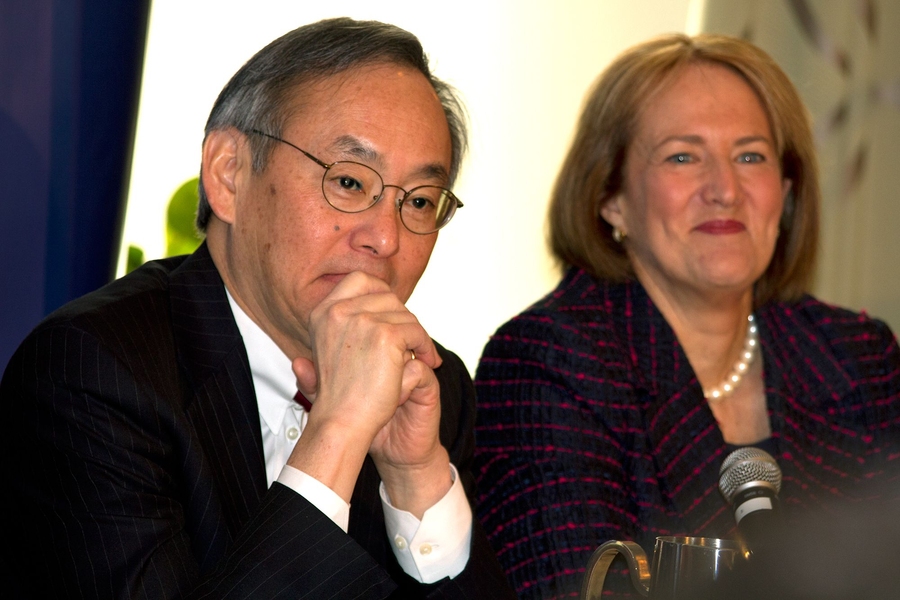U.S. Secretary of Energy Steven Chu announced a new national program intended to spur clean-energy innovation, in remarks at a forum at MIT on Tuesday.
The Department of Energy program, dubbed “America’s Next Top Energy Innovator,” would drastically reduce the costs for startup energy companies of licensing any of the roughly 15,000 patents held by the federal government’s National Laboratories, where basic scientific research is done.
“We’re challenging entrepreneurs to move technologies invented in our National Laboratories out of the lab and into the marketplace,” Chu said. Examples of those technologies, he noted, range from software that helps reduce energy use in buildings to ways of converting solar power into thermal energy on demand.
The program allows startups to license up to three National Laboratories patents for just $1,000 each, between May 2 and Dec. 15. Normally those patents cost from $10,000 to $50,000 to obtain. The plan would also simplify the technology-licensing process, making it easier and cheaper for startups to develop new products.
In the field of clean energy, said Chu, “There is a race out there [to be] the first companies, and the first countries, that develop these technologies.” Critical innovations, Chu said, would include long-lasting, small, cheap automobile batteries that could power vehicles for up to 300 miles at a time. Of the quest to make solar power as cheap as fossil fuels, Chu added, “I’m almost certain it will happen within two decades.”
'Startup America' aims to back new businesses
Chu made the announcement at an MIT forum in which an array of White House officials discussed the administration’s “Startup America” initiative, launched in January, which is intended to help new firms and small businesses succeed. The event, held in MIT’s Faculty Club, was attended by leaders from the Boston area’s business community as well as government officials, and consisted of a central opening panel followed by several small discussion sessions involving administration officials and MIT faculty.
Karen Mills, the head of the government’s Small Business Administration (SBA), began the event by pointing out that about half of all Americans are employed by startup or small businesses, and outlined a variety of measures intended to give those firms “the support that they need to grow and create jobs.” Mills added that having the event at MIT “was like coming to Entrepreneur Central,” given the Institute’s nexus of activities in both research and technology development, which were “turning innovation into jobs.”
The government measures comprising the “Startup America” initiative fall into a few distinct categories: access to capital, often in the form of loans when startups cannot get the right level of venture financing they need; mentorship programs for entrepreneurs; programs intended to commercialize government-sponsored research, of the kind Chu announced; and streamlined regulations for startups and small businesses.
During introductory remarks at the event, MIT President Susan Hockfield emphasized the Institute’s role in driving the innovation economy. Living MIT alumni, she noted, have founded roughly 25,800 currently active companies, a figure she attributed to the research of Edward B. Roberts, professor at the MIT Sloan School of Management and chair of the MIT Entrepreneurship Center. Roberts was in attendance at the event.
Hockfield also noted that the Institute has launched a new study, “Production in the Innovation Economy,” to identify the policies and ideas that are crucial to 21st-century manufacturing growth. “What we’re really interested in is bringing a jobs boom back to communities around the United States,” Hockfield added.
Cass Sunstein, head of the White House’s Office of Information and Regulatory Affairs, spoke at the event on the need to have sensible business regulations that limit the amount of paperwork firms must file and that reduce legal redundancies.
President Barack Obama, Sunstein noted, has authorized him to conduct the first comprehensive review of federal regulations in the nation’s history. Agencies have until May 18 to propose roadmaps for overhauling their regulations, and are currently especially open to useful feedback from citizens.
“It’s prime time for that,” Sunstein said. At one later segment of Tuesday’s event, Mills and Sunstein also fielded public comments from the audience about the barriers to innovation that startups and existing small businesses currently face; the session was moderated by Desh Deshpande, a life member of the MIT Corporation and founder of MIT’s Deshpande Center for Technological Innovation, which helps bring innovations to the marketplace.
Other MIT faculty participating in breakout sessions included William Aulet, managing director of the MIT Entrepreneurship Center, which fosters academic partnerships with industry, and Elisabeth Reynolds, executive director of MIT’s Industrial Performance Center, which studies global industrial trends.
The Department of Energy program, dubbed “America’s Next Top Energy Innovator,” would drastically reduce the costs for startup energy companies of licensing any of the roughly 15,000 patents held by the federal government’s National Laboratories, where basic scientific research is done.
“We’re challenging entrepreneurs to move technologies invented in our National Laboratories out of the lab and into the marketplace,” Chu said. Examples of those technologies, he noted, range from software that helps reduce energy use in buildings to ways of converting solar power into thermal energy on demand.
The program allows startups to license up to three National Laboratories patents for just $1,000 each, between May 2 and Dec. 15. Normally those patents cost from $10,000 to $50,000 to obtain. The plan would also simplify the technology-licensing process, making it easier and cheaper for startups to develop new products.
In the field of clean energy, said Chu, “There is a race out there [to be] the first companies, and the first countries, that develop these technologies.” Critical innovations, Chu said, would include long-lasting, small, cheap automobile batteries that could power vehicles for up to 300 miles at a time. Of the quest to make solar power as cheap as fossil fuels, Chu added, “I’m almost certain it will happen within two decades.”
'Startup America' aims to back new businesses
Chu made the announcement at an MIT forum in which an array of White House officials discussed the administration’s “Startup America” initiative, launched in January, which is intended to help new firms and small businesses succeed. The event, held in MIT’s Faculty Club, was attended by leaders from the Boston area’s business community as well as government officials, and consisted of a central opening panel followed by several small discussion sessions involving administration officials and MIT faculty.
Karen Mills, the head of the government’s Small Business Administration (SBA), began the event by pointing out that about half of all Americans are employed by startup or small businesses, and outlined a variety of measures intended to give those firms “the support that they need to grow and create jobs.” Mills added that having the event at MIT “was like coming to Entrepreneur Central,” given the Institute’s nexus of activities in both research and technology development, which were “turning innovation into jobs.”
The government measures comprising the “Startup America” initiative fall into a few distinct categories: access to capital, often in the form of loans when startups cannot get the right level of venture financing they need; mentorship programs for entrepreneurs; programs intended to commercialize government-sponsored research, of the kind Chu announced; and streamlined regulations for startups and small businesses.
During introductory remarks at the event, MIT President Susan Hockfield emphasized the Institute’s role in driving the innovation economy. Living MIT alumni, she noted, have founded roughly 25,800 currently active companies, a figure she attributed to the research of Edward B. Roberts, professor at the MIT Sloan School of Management and chair of the MIT Entrepreneurship Center. Roberts was in attendance at the event.
Hockfield also noted that the Institute has launched a new study, “Production in the Innovation Economy,” to identify the policies and ideas that are crucial to 21st-century manufacturing growth. “What we’re really interested in is bringing a jobs boom back to communities around the United States,” Hockfield added.
Cass Sunstein, head of the White House’s Office of Information and Regulatory Affairs, spoke at the event on the need to have sensible business regulations that limit the amount of paperwork firms must file and that reduce legal redundancies.
President Barack Obama, Sunstein noted, has authorized him to conduct the first comprehensive review of federal regulations in the nation’s history. Agencies have until May 18 to propose roadmaps for overhauling their regulations, and are currently especially open to useful feedback from citizens.
“It’s prime time for that,” Sunstein said. At one later segment of Tuesday’s event, Mills and Sunstein also fielded public comments from the audience about the barriers to innovation that startups and existing small businesses currently face; the session was moderated by Desh Deshpande, a life member of the MIT Corporation and founder of MIT’s Deshpande Center for Technological Innovation, which helps bring innovations to the marketplace.
Other MIT faculty participating in breakout sessions included William Aulet, managing director of the MIT Entrepreneurship Center, which fosters academic partnerships with industry, and Elisabeth Reynolds, executive director of MIT’s Industrial Performance Center, which studies global industrial trends.









